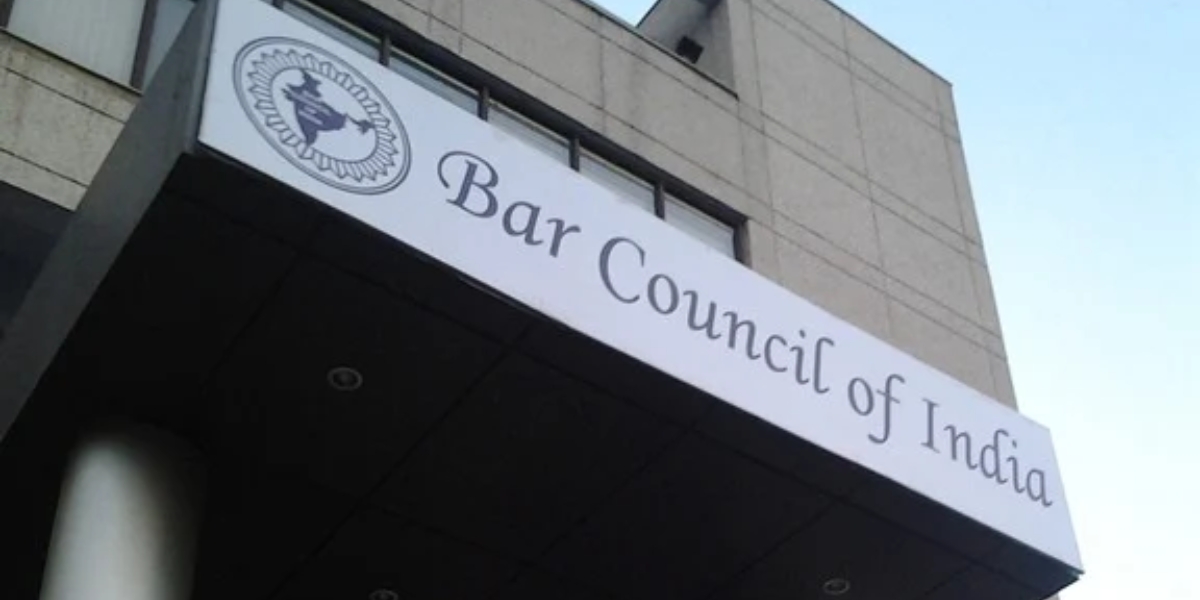In a recent ruling, Mehak Oberoi v. Bar Council of India & Ors., the learned Delhi HC addressed a crucial issue concerning the eligibility of foreign law graduates to practice in India. The Delhi High Court has made it clear that foreign law graduates must pass the Bar Council of India (BCI) Qualifying Examination to practice law in India. Simply completing a bridge course is not enough to meet this requirement. This decision highlights the need to maintain consistent standards for legal practice across the country.
The Bar Council Requirements
The BCI, through a notification, introduced bridge courses in 2016 for foreign law degree holders to start practising in india. The bridge course was introduced to address the gaps between the curriculum of foreign universities and the Bar Council of India’s (BCI) Legal Education Rules, 2008. It aimed to help foreign law graduates align their education with the standards needed to practice law in India.
This course specifically targeted students who completed three-year or four-year LLB programs from countries like the United Kingdom and other European nations. Since these programs often included social sciences subjects, they didn’t fully cover key aspects of Indian legal education. To fill these gaps, the BCI required a one-year bridge course for graduates of four-year programs and a two-year course for those from three-year programs.
The following are the essential papers in this bridge course:
- Indian legal and judicial systems
- Constitution of India
- Criminal Procedure Code
- Civil Procedure Code and Limitation Act
- Indian law of evidence
- Property law
- Professional Ethics
And this bridge course was to be provided by the following law universities in India:
- National Law School of India University, Bangalore
- National Law University, Delhi
- National Academy of Legal Studies and Research University (NALSAR), Hyderabad
- The West Bengal National University of Juridical Sciences, Kolkata, West Bengal
The bridge course was introduced after the earlier apprenticeship or internship scheme proved unsuccessful due to a lack of proper verification processes. Many foreign LLB graduates submitted certificates from lawyers or law firms, but these could not be reliably verified. To address this issue, the Bar Council of India (BCI) replaced the scheme with the bridge course, making it a mandatory pre-bar requirement. This ensured that students returning with foreign law degrees had the necessary understanding of Indian laws and the legal system to practice in the country.
Another notification, dated 21.02.2023 laid down the requirements for Indian citizens with a foreign law degree to appear in the Qualifying Examination. Starting from the academic session 2023-2024, law degrees from foreign universities that are not recognized by the Bar Council of India (BCI) will no longer be considered equivalent to Indian law degrees. As a result, Indian students holding such degrees will be ineligible to appear for the BCI’s Qualifying Examination for Foreign Law Graduates or register with any State Bar Council in India.
Only degrees from foreign universities that are approved (List of approved and recognized universities) by the BCI’s Legal Education Committee will be eligible for equivalence, provided the candidates pass the Qualifying Examination and fulfill the other requirements outlined in the Advocates Act, 1961.
The BCI has also outlined the standard legal education pathways in India: a 12 + 3 years (graduation) + 3 years LLB degree or a 12 + 5 years integrated law degree. If an Indian student completes a law degree abroad that does not follow this pattern but is recognized by the BCI, they can make up for the gaps by taking a bridge course. For instance:
- For a 12 + 3 years foreign law degree: A two-year bridge course from India International University of Legal Education and Research, Goa, is required.
- For a 12 + 3 (graduation) + 3 years foreign law degree: No bridge course is needed if the degree is BCI-recognized. These graduates can directly appear for the Qualifying Examination after receiving an equivalence certificate from the BCI.
About the Case
Facts
Mehak Oberoi is an Indian citizen who graduated with an LLB degree in 2020 from the University of Buckingham, which is recognized by the Bar Council of India (BCI). She returned to India and joined a two-year bridge course at National Law University (NLU), Delhi, to make her qualifications compliant with the standards of Indian legal education. She successfully completed the course at the BCI-recognized institution. The bridge course aimed to align her foreign law degree with Indian legal education standards. On completing the course in September 2024, she received a certificate indicating her readiness to practice law in India.
Despite this, the BCI, through a notification issued on 11 November 2024, required her to appear for the “21st Qualifying Examination for Indian Nationals Holding Foreign Law Degrees” as a condition for enrollment in the Indian Bar. Feeling aggrieved, Mehak challenged the notification on the grounds that the additional requirement was discriminatory, redundant, and imposed an unfair financial and procedural burden on candidates like her, who had already undergone a rigorous equivalency process.
Issues
1. Whether the BCI can mandate candidates with a foreign degree to clear the Qualifying Examination who have already completed a bridge course?
2. Whether the notification creates unjust and discriminatory barriers for students with foreign law degrees.
Petitioner’s Arguments
The petitioner contended that she had already satisfied the academic requirements prescribed by the BCI by completing her LLB at a recognized foreign university and subsequently clearing the bridge course conducted by NLU Delhi. She argued that compelling her to appear for the qualifying examination was unnecessary and amounted to double testing.
She emphasized that the bridge course syllabus covered the subjects included in the qualifying examination, rendering the latter redundant. Furthermore, this additional requirement discriminated against candidates with foreign law degrees, as Indian law graduates were not subjected to similar tests. The petitioner also argued that the notification imposed a significant financial burden, deterring students from pursuing legal education abroad.
To support her case, Mehak referred to Karan Dhananjaya v. Bar Council of India, where the Karnataka High Court had exempted a petitioner from taking the qualifying examination after completing a bridge course. She also cited Gaurav Kumar v. Union of India & Ors., in which the Supreme Court stressed that the BCI’s authority must be exercised fairly, reasonably, and in proportion.
Defendant’s Arguments
On the other hand, the respondents, including the BCI, opposed her plea. They maintained that the qualifying examination is a legal requirement under Rule 37 of the BCI Rules. They further argued that Mehak had been informed about this condition back in 2021 when she applied for the bridge course and had voluntarily accepted it by proceeding with the course.
The BCI contended that the qualifying examination was distinct from the bridge course and assessed substantive and procedural legal knowledge necessary for practicing law in India. They emphasized that this requirement was vital to maintaining professional standards and was uniformly applied to all candidates with foreign law degrees. The respondents also distinguished the Karan Dhananjaya case, arguing that it involved a different regulatory framework and notification.
Court’s Analysis & Judgement
The court examined the petitioner’s arguments and the regulatory framework governing the qualifying examination. It noted that Rule 37 of the BCI Rules clearly mandates that Indian nationals with foreign law degrees must pass a qualifying examination to practice law in India, in addition to completing the bridge course where necessary.
The court distinguished between the purposes of the bridge course and the qualifying examination. The course of the bridge will serve to fill the deficit in the number of years of legal education required for equivalency with Indian law degrees. The qualifying examination, on the other hand, tests the candidate’s substantive and procedural legal knowledge necessary for the practice of law in India. The court held that these two processes are complementary but distinct, and one cannot be substituted for the other.
Further, the court underscored that the qualifying examination serves a crucial regulatory purpose distinct from the bridge course. It dismissed the petitioner’s assertion that the bridge course curriculum already included the examination curriculum, and it emphasized how the rules clearly require the evaluation to be done with a separate qualifying examination.
The court also dismissed the petitioner’s contention that the requirement was discriminatory. The court said that the difference between the candidates with Indian and foreign law degrees was reasonable and served the important purpose of maintaining consistent professional standards for all lawyers practicing in India. In its final decision, the court upheld the validity of the BCI’s notification and dismissed the petition. It ruled that the petitioner was not entitled to an exemption from the qualifying examination and that compliance with the rules was mandatory for enrollment in the Indian Bar.
The Way Ahead
If any Indian citizen holding a foreign law degree aims to practice law in India, he/she must appear in the BCI Qualifying Examination. The 21st Qualifying Examination is to be held between 14th December 2024 to 19th December 2024 in the premises of the Bar Council of India at 21, Rouse Avenue, Institutional Area, New Delhi-110002.
The Schedule of the examination is:
| Sl. No. | Date & Time of the Examination | Paper |
| 1. | Saturday, 14.12.202411.00 AM to 02.00 PM | Constitution of India |
| 2. | Sunday, 15.12.202411.00 AM to 02.00 PM | Contract Law & Negotiable Instruments Act |
| 3. | Monday, 16.12.202411.00 AM to 02.00 PM | Company Law |
| 4. | Tuesday, 17.12.202411.00 AM to 02.00 PM | Civil Procedure Code and Limitation Act. |
| 5. | Wednesday, 18.12.202411.00 AM to 02.00 PM | Criminal Procedure Code |
| 6. | Thursday, 19.12.202411.00 AM to 02.00 PM | The Indian Legal Profession and Code of Ethics. |
The format of the examination will be the following:
- There shall be 6 physical papers of 3 hours each and of 100 marks each spread over 6 days.
- Each paper shall carry 100 marks.
| 5 short questions of 5 marks each | 5 X 5 = 25 marks. |
| 3 questions of 15 marks each | 3 X 15 = 45 marks. |
| 1 question of 30 marks | 1 X 30 = 30 marks. |
| Total: | 100 Marks |
General rules of the examination are:
A. No bare acts and books, including question answer guides, notes etc. shall be allowed for the following three papers
1. Constitution of India (Paper-1 on 14.12.2024),
2. Contract Law and Negotiable Instruments Act (Paper-2 on 15.12.2024)
3. Company Law (Paper-3 on 16.12.2024)
B. Only individual bare acts (not digests) (as available in the market, preferably with least short notes) shall be allowed for the following 3 papers. The bare acts, which may be allowed, should not bear any notings by pen/pencil, chits as per the past practice and decision of Committee.No books, including question answer guides, notes shall be allowed
1. Civil Procedure Code and Limitation Act, (Paper-4 on 17.12.2024)
2. Criminal Procedure Code (Paper-5 on 18.12.2024) and
3. The Indian Legal Profession and Code of Ethics (Paper-6 on 19.12.2024).
- For other rules, official notification, examination form and detailed syllabus, refer to the official BCI website here.
Conclusion
The Delhi High Court’s decision in Mehak Oberoi v. Bar Council of India and Ors. highlights the significance of the BCI’s qualifying exam in maintaining standards within India’s legal profession. By emphasizing the importance of this exam, the court has reinforced the discipline and credibility essential to practicing law in the country. For foreign law graduates aiming to practice in India, the process may be challenging but remains well-defined. This landmark ruling not only streamlines the procedure but also underscores the commitment to upholding the integrity of the legal profession.


